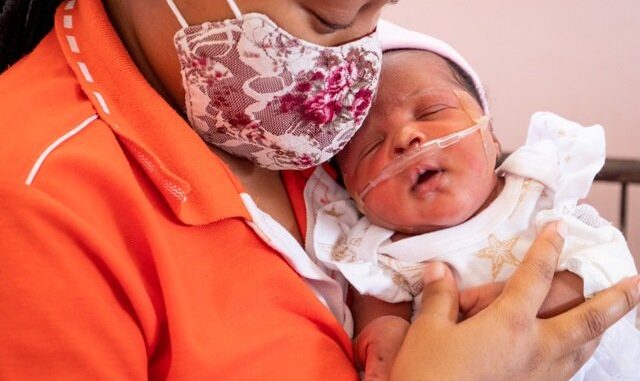
Malnutrition among infants is a serious healthcare concern in South Africa, with around 25% of children under 5 facing stunting. At the same time, with 13% of young children overweight, our health system carries one of the highest burdens of childhood obesity worldwide – a problem exacerbated by the prevalence of formula feeding.
Children’s healthcare experts and maternal care practitioners the world over are unanimous that breastmilk results in better healthcare outcomes for infants. Breastfeeding encouragement and support are essential strategies to combat the infant epidemics of both malnutrition and obesity.
“Yet in SA we still see one of the lowest rates of breastfeeding in Africa, falling behind countries like Kenya and Rwanda – where over 60% of babies are exclusively breastfed for their first six months of life – and lagging behind our neighbours like Botswana and Eswatini,” says Stasha Jordan, SABR’s (South African Breastmilk Reserve) Executive Director.
“Although we’re starting to see hopeful signs of breastfeeding being accepted, there are still a lot of negative stigmas surrounding it – unfounded taboos, and patriarchal attitudes that we urgently need to dismantle for our children to thrive,” says Jordan.
She has worked on the ground with new and birthing mothers, for over two decades, experiencing first-hand the phenomena that are the subjects of medical research papers in the fields of maternity- neonatal- and obstetric care.
For over 20 years the SABR’s human milk banking system has saved lives and improved health outcomes for neonates and newborns, closing the gap between the time when neonates are born and their mothers start to lactate, and as an emergency intervention when new mothers are not able to produce milk.
The SABR’s holistic methodology suggests the Kangaroo Care Method (KMC) which promotes as much skin-to-skin contact between mother and baby and frequent breastfeeding supported by health care professionals and human milk bankers in the NICU, not only in post-partum hospital settings but in the context of early childhood development overall.
“This promotes optimal health for the baby, and is associated with a variety of health benefits for the mother too, including stress reduction, and lower risks of breast cancer,” Jordan notes.
Basic antenatal care, along with breastfeeding support (BANC+) are keystones of the organisation’s work, and they routinely collaborate with maternity and neonatal wards around the country.
The SABR currently supply life-saving human breast milk for premature and sick babies to over 80 neonatal ICUs at SA hospitals, with a particular focus on the country’s most vulnerable populations, in under-resourced rural areas.
“But breastfeeding is not only a key childhood healthcare driver, it’s also an essential poverty alleviation strategy,” Jordan explains. “Many South African mothers are struggling to make ends meet. Some rely solely on state support grants to feed themselves and their families. We encourage new mothers to use their resources to feed themselves and their households, rather than relying on expensive infant formula.”
Unscrupulous marketing on the part of formula manufacturers – whose targeted campaigns are often designed to undermine natural breastfeeding – has been identified as a factor inhibiting a culture of acceptance around breastfeeding in SA, with corporate interests having even infiltrated professional medical contexts.
Researchers have suggested that infant formulas are also infants’ first touch point with sugary highly processed foodstuffs, which may be tastier and more addictive, but far less nutritious than natural breastmilk. This may set steer them onto a challenging nutritional trajectory that is not easy to change.
Breastmilk grants babies a measure of natural immunity against various gut infections, such as necrotising enterocolitis – a massive risk for young infants and neonates.
“Breastfeeding is therefore not only cheaper for mothers and healthier for babies, it’s environmentally sustainable, and a culture of breastfeeding is closely aligned with global SDG goals.”
Research reveals that the world could save 300 billion dollars in healthcare costs from failed breastfeeding, and save the lives of some 800 000 babies, if we could make sure that babies are breastfed, especially for their first 6 months of life.
“In SA’s context, where mothers are often returning to homes in areas without adequate access to the electricity and clean water needed to safely prepare formula, it’s essential for mothers to try their best to breastfeed, and to reach out to us for breastfeeding support, or delivery of banked human milk in emergencies,” she asserts.
“Babies are little humans. They too have human rights, but unlike us, they don’t yet have the voice to insist on them. It’s up to all of us to be their voice. As with any other person, their right to eat if they are hungry trumps any other cultural or societal consideration around breastfeeding. As a society we must stop shaming mothers for breastfeeding, immediately.”
“Rather than relegate our mothers to marginal spaces, like ‘breastfeeding rooms’ which reinscribes the stigma, we need to make sure that the entire country is a safe space, in which babies can be fed wherever and whenever they’re hungry.”
“We aim to exceed the WHO’s target of a 50% exclusive breastfeeding rate for infants under six months. We believe it is feasible for 80% to 90% of all infants in this age group to be breastfed, and enjoy the myriad health and nutrition benefits it entails. Our current rate stands at around 32 %, while one in four infants are not breastfed at all,” she says.
“Women who embrace breastfeeding are not just nourishing their children; they are actively providing one of the most vital community health services, and are contributing significantly to the resilience and well-being of the next generation of South Africans. It’s crucial that we give them the support, respect, and encouragement they deserve.”
